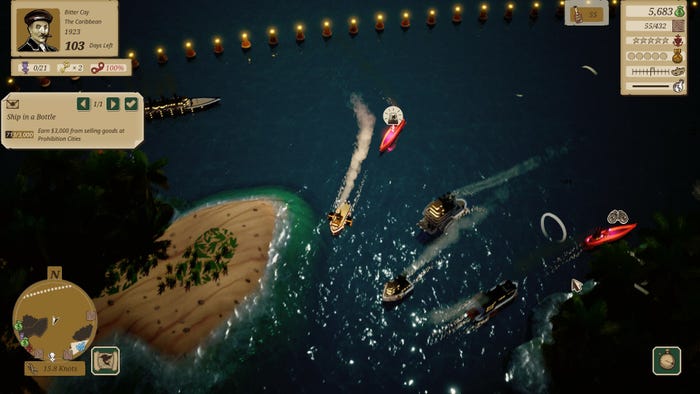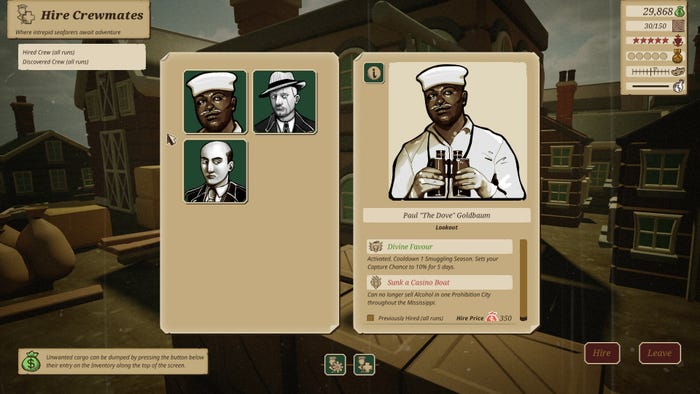Trending
Opinion: How will Project 2025 impact game developers?
The Heritage Foundation's manifesto for the possible next administration could do great harm to many, including large portions of the game development community.

Several games draw upon the Roaring Twenties—from striking art deco architecture and snazzy jazz music to themes of oppression and rebellion. Some of this inspiration is direct, from 1982's Gangbusters to 2K Games' Mafia series and Romero Games' Empire of Sin. Others are more anachronistic in their influences, forming part of the backdrop for a fictional world or otherworldly event, such as the Bioshock series and The Sinking City.
But while its influence looms large, it's surprisingly rare to see the era featured as a setting in a video game.
I previously worked at Royal Museums Greenwich on the historic tea clipper Cutty Sark and came across a snippet of the Prohibition story, thanks to the whisky named after it. It became an iconic brand during Prohibition as a symbol of quality and was highly sought after amongst droves of home-brewed horrors. The maritime perspective of this era is an especially underexplored part of Prohibition's story.
While games set during Prohibition will naturally feature alcohol, there's a wealth of ideas left barely touched; from bootleggers to prohibitionists, and the overarching moral quandary about the positives and negatives of alcohol. Maybe these areas appear too 'dry' on the surface, or the more obviously action-packed nature of the mafia is simply more appealing.
For developers that have taken the plunge into the era, how did Prohibition inspire them? What challenges did they face along the way, and why is this a road less traveled?
"It's much more exciting to think about the car chases and shootouts that could have happened to secure a shipment than the nuts and bolts of smuggling. But, more importantly, the fictional mobster archetype lends itself to endless stories and very rich drama," says Haden Blackman, Escape Velocity co-founder and CEO, former Hangar 13 president and chief creative officer on Mafia: Definitive Edition and Mafia 3.
The American Mafia, commonly referred to as 'the mob' is a network of Italian-American organized crime families and is intrinsically linked to the era. "Prohibition was a period of expansion and economic growth for the mob," explains Blackman. "The mob's willingness to flaunt the law, combined with its existing experience with other criminal enterprises [...] allowed the Mafia to capitalize on the demand for alcohol created by Prohibition."

Image via Hangar 13/2K.
"This led to violent clashes—both with authorities and rival groups; and the influx of money allowed a lifestyle that has been glamorized and held up as aspirational on some level. All these factors combine to create the perfect mob fantasy—a world ripe for the taking through force—which is fertile ground for both gameplay and narrative."
Even with its magnetism and saturation in popular culture, other games featuring Mafia organizations set in the era aren't as numerous as you'd think. Beyond this, far fewer games explore the role of bootleggers in Prohibition to a significant degree, so Junkfish Games' Bootleg Steamer took me by surprise.
In an interview, Bootleg Steamer design and creative lead Michael Macleod explained how he was directly inspired by his interest in maritime history and from growing up as part of a shipping family in the North West Highlands. Alongside his father and grandfather's fishing boats, his great-uncles worked on ocean liners at the world famous shipbuilding hub on the Clyde—which is also where Cutty Sark was built.
Macleod's personal connection meant he was able to provide unique insight into this hitherto unexplored side of Prohibition during development. The light-hearted, strategy roguelike sidelines the mafia in favor of nautical hijinks; placing a bigger focus on economy, commerce, and the risk/reward aspects of smuggling.
Junkfish Games accepted that the inclusion of alcohol was unavoidable in Bootleg Steamer and would naturally affect the PEGI rating. But, as an indie game releasing on Steam it's important to keep the potential audience as broad as possible.
To avoid pushing the rating beyond 16, the team limited any other content that could bump up the rating. For example, the Mafia may be an optional interaction, but are still present as a potential business venture and dealing with them has consequences. "There were things like: 'would we have them shooting the ship and sinking it and outright killing the crew?'" Macleod explains. "That was the kind of thing we strayed away from. We're referring to violence in the game, but we don't really show it."

Image via Junkfish Games.
For Macleod, Prohibition lends itself to a Robin Hood angle; working around a law that was considered unjust and providing a different view on a life of crime that we see presented in titles like Grand Theft Auto. To this day, historical figures such as Captain William "Bill" McCoy are heralded for their actions. His reputation for bringing only the finest liquor to America earned those spirits, including Cutty Sark whisky, the moniker: "the real McCoy".
Junkfish also had to leave a significant portion of the bootlegging ecosystem on the cutting room floor due to technical constraints. Macleod said there's so much more to do in the setting, aspects like truck deliveries, brewing alcohol, and strategic opportunities in combining land and sea operations.
Concerns around global appeal and market understanding also need to be considered and could be a factor in why games in this setting are limited. "Ultimately, an American audience [understands] Prohibition. The Singapore side of our studio had concerns that when the game was trying to move on the Asia side, the market over there might not be as aware of Prohibition and we'd have to spend some effort to explain what Prohibition was," Macleod explains.
That said, the bootlegging dream has made it to some players far from the rum-running capital of Chicago. "We took the game to Gamescom Asia and a lot of the players [...] got it straight away."
The available technology of the prohibition era can potentially constrain developers from giving players tools they're used to having. For instance, Blackman said the Mafia: Definitive Edition team couldn't easily give players the classic sniper rifle, because it would have been "rare" for a mobster to have one in the 1930s. There were still solutions available. "We established that one of our characters is a weaponsmith, and he cobbled together a gun that functions much like a sniper rifle for a specific mission," Blackman said.
Blackman adds that developers can feel "a lot of pressure to innovate on gameplay" so these technological and historical limitations can sometimes be off-putting.
In Mafia: Definitive Edition, players navigate the harsh realities of mob life through the eyes of protagonist Tommy Angelo. Prohibition lends itself well to the modern lens as a period of great change and uncertainty, full of oppression, activism, and economic downturn—fostering stories that we can relate to today. "A relatable character has very human motivations and problems, so we establish Tommy struggling financially early on, which is something many of us can understand," explained Blackman.

Image via Junkfish Games.
Bootleg Steamer's initial game jam pitch was originally more literal in its representation of bootlegging, but as the idea developed, the team moved away from getting granular with history and focused on a fun, frenetic gameplay approach—the kind of interpretation you'd see in a board game set in the era.
The clandestine nature of bootleggers provided Junkfish Games with an opening to create a more diverse cast of characters than you'd find in movies or TV shows set in the bootlegging era. "I think one of the things that was quite nice about working with Prohibition was the sense that [some of] the best Prohibition smugglers are the ones that never got caught, the ones you've never heard about. They made a fortune, retired, and history doesn't know about them," says Macleod. That raised the idea that players could take on the role of smugglers of different races or genders, since it would be ‘authentic' that they'd existed in the time period, but simply slipped through the cracks of history.
Developers wishing to dive into the era should know there's more nuance to be found in the ban on alcohol than pop culture tells us. Mark Schrad, PhD, Professor of Political Science at Villanova University explained to Game Developer that many stories you may know about Prohibition often misunderstand that the temperance movement was popular enough to get a constitutional amendment passed in the United States.
"I'm always astounded at how far off modern, pop-culture depictions of temperance and prohibitionists are from the actual, historical reality," he says. "Temperance was a very progressive movement of liberation against the predatory capitalism of the 'liquor traffic,' which got people addicted for profit."
"Now, when it comes to the Prohibition Era—the gangland shootouts, Al Capone, Elliot Ness and all that—I'm generally fine with those sorts of depictions. At the very least, they don't twist the motivations of the historical figures to match our contemporary understandings, which has been the case with depictions of temperance."
It's clear why more titles cherry-pick from Prohibition to allow for greater freedom and scope. The gunplay is a great fit for video games, but the social dynamics of the era aren't as easy to depict.
Schrad is surprised to learn that games set in this period are somewhat limited. "One would think that this would be a very fertile context for developing video game storylines," Schrad explains. "I could imagine some Grand Theft Auto-type games set in the Prohibition Era of the 1920s, with petty bootleggers and rum-runners climbing the ranks of the underworld to build an illicit booze empire."
"The thing about Prohibition is that there is automatically some degree of sympathy built-in for the villain. After all—from shyster to kingpin—the bad guy is simply trying to slake the thirst of the citizenry, which largely saw no harm in the occasional drink [...] one could more easily side with the criminal against what is largely seen as unjust laws," Schrad explains. "I'd think it'd be easy for [...] people to imagine themselves projected back in time to that historical context as the valorous criminal against bad-guy law enforcement."
You May Also Like